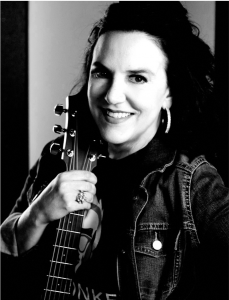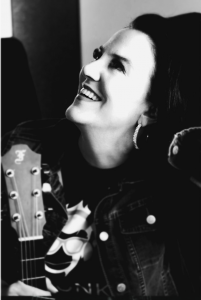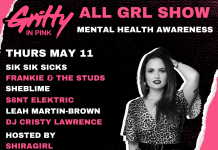By Brian Caples
 Fretmonkey Records is often referred to as “The Most Progressive Artist Community in the Guitar World,” and rightfully so. Their label operates on an artist collaboration model, where artists influence the decision-making and operations of the community. Through making decisions as a unit rather than as solo independent artists, Fretmonkey musicians from around the globe build opportunities for themselves and fellow DIY musicians. It’s no wonder why the company identifies with the Margaret Mead quote, “Never doubt that a small group of thoughtful, committed citizens can change the world; indeed, it’s the only thing that ever has.”
Fretmonkey Records is often referred to as “The Most Progressive Artist Community in the Guitar World,” and rightfully so. Their label operates on an artist collaboration model, where artists influence the decision-making and operations of the community. Through making decisions as a unit rather than as solo independent artists, Fretmonkey musicians from around the globe build opportunities for themselves and fellow DIY musicians. It’s no wonder why the company identifies with the Margaret Mead quote, “Never doubt that a small group of thoughtful, committed citizens can change the world; indeed, it’s the only thing that ever has.”
Fretmonkey’s owner, Dr. Alicia Cotabish, is to thank for creating this community of independent fingerstyle guitarists. Under her guidance, Fretmonkey’s branding has expanded globally through several fingerstyle guitar festivals and monthly international guitar nights. On top of running Fretmonkey Records, Dr. Alicia Cotabish is also an Associate Professor of Teaching and Learning at the University of Central Arkansas, and has co-authored several books on teaching, focusing mostly on STEM, gifted education, and peer coaching.
We spoke with Dr. Cotabish about running a label while teaching, taking the company international, and Fretmonkey’s plans for the rest of 2019.
More information on Fretmonkey can be found at fretmonkeyrecords.com.
The WiMN: How prominent was music in your life growing up? Who were the musicians that made you want to pursue a career in music?
AC: I started playing the acoustic guitar at the age of 5. I played non-stop when I was young and continued on until I was about 18. My father was a keyboard player which greatly influenced me at a young age. We would sit around the house jamming to tunes from the 60s and 70s with my guitar teacher. As a young child, my parents entered me into talent competitions, and later it would serve as my talent in pageants. I learned to get over stage fright early on which served me well later in life. Early influences were Linda Ronstadt, Bette Midler, and Stevie Nicks.
As an adult, I can honestly say that I never really considered pursuing a career in music. It wasn’t that I didn’t want to, though. It was because of a series of life choices. I married at 17 which led to the decision to drop out of high school since I no longer felt like I could fit in. I half-heartedly enrolled in community college for a while, but dropped out when I had a child at 19. The relationship ended, and I divorced at 21. Being a broke single mom prompted me to return to college and my music completely ceased. I identified education as a means to solve my woes. I ended up spending nearly 20 years of my adult life in college earning 6 degrees along the way including a graduate certificate from Harvard and a doctoral degree that would allow me to work in higher education.
At 30, I married a guitar-playing electrical engineer (Dennis Cotabish), and raised a guitar-playing son. Along the way, I had two more children. It wasn’t until my oldest son, Kevin ‘Blake’ Goodwin, won his first international acoustic guitar competition that I became involved in the business side of the music industry as his manager. In late 2015, Blake founded Fretmonkey with our family’s blessing and financial backing, and gathered 23 musicians in 10 countries to launch an international collaborative community for acoustic fingerstyle guitar players. We built a recording studio on the back of our property to support the effort. Being newbies, we had no idea what we were getting into – we were so naive. We launched the record label March 1, 2016 and Blake quickly became overwhelmed with simultaneously running a record label and a recording studio, so I stepped in to run the label side of things while he focused on running the recording studio. It has been the most exhilarating and demanding job ever, but I have never regretted the decision.
The WiMN: As the owner of Fretmonkey, what are some of your day-to-day responsibilities?
AC: Working with artists, booking agents and sponsors, and coordinating events, shows, and festivals that bear the Fretmonkey name. A tremendous amount of time is spent on the phone with event organizers and booking agents. Of course, there is also the day-to-day task of social media marketing and emails. Much of it happens in the evening since many of the people I deal with live overseas. My favorite thing is when I have the opportunity to be in the room with people, though. I truly believe that Fretmonkey’s success has been built on the traditional handshake and being in the room with folks. It’s a community, so it is all about relationships.
The WiMN: One of the things that makes Fretmonkey Records stand out from other labels is the fact that it runs entirely through an artist collaboration model. Could you briefly explain how this works and what inspired this decision?
AC: Fretmonkey primarily works with independent DIY solo artists. We require artists to work alongside us and bear much of the effort required to launch their music and career. In 2017, we moved from a record label model to an organized global community that offers record label services. It was the only way to expand our artist services and relieve some of the heavy expenses we were incurring. Essentially, we ask artists to do certain tasks (e.g., social media posts, obtain artwork, conduct live streams, work with their own networks, conduct pre-sale events, etc.). They deliver the packaged goods and help market while we work on setting up the release and work with our partners to maximize exposure. We also submit artists’ music for Grammy consideration and work with music gear manufacturers to secure them product endorsements.
Another difference is that we ask artists to pay for all of these services instead of the ‘label’ picking up the up-front costs. One example of this is that artists pay ‘actual costs’ to boost their posts from our social media pages and any other costs associated with their releases. Requiring them to invest time and resources in their art tends to weed out the recreational musician from the professional musician. However, we don’t take a dime from musicians for our services. Our company is funded through event ticket sales and sponsorships.
The WiMN: Fretmonkey has expanded globally since launching in 2015, hosting monthly events in the Edinburgh, Belfast, and Manchester, just to name a few places. Was going international always a goal for the label?
 AC: Simply put, yes. We started off as a global organization, but the structure has dramatically changed over time. During our first two years, we operated as a record label on behalf of the 23 founding members. We also briefly dabbled in creating an official video sharing platform for the community called Fretmonkey Nation. After a soft launch, we realized our following was not big enough to sustain it so we tabled it; however, we still hope to repurpose it in the future. We also ran an internet radio show called “Fretmonkey SlapNutz Radio Show” for a year from the Fretmonkey Studio which aimed to promote the 23 founding artists. It was picked up in several markets in the US and oversees, but the tremendous effort never really translated into growth. We stepped back for a moment to reflect on everything we were doing and found we had an ineffective and cost-prohibitive model.
AC: Simply put, yes. We started off as a global organization, but the structure has dramatically changed over time. During our first two years, we operated as a record label on behalf of the 23 founding members. We also briefly dabbled in creating an official video sharing platform for the community called Fretmonkey Nation. After a soft launch, we realized our following was not big enough to sustain it so we tabled it; however, we still hope to repurpose it in the future. We also ran an internet radio show called “Fretmonkey SlapNutz Radio Show” for a year from the Fretmonkey Studio which aimed to promote the 23 founding artists. It was picked up in several markets in the US and oversees, but the tremendous effort never really translated into growth. We stepped back for a moment to reflect on everything we were doing and found we had an ineffective and cost-prohibitive model.
We also realized that working with 23 artists in a record label capacity was counter to our mission which was aimed to serve the larger international fingerstyle guitar community, so we pivoted. After great thought, we released artists from their contracts, but they were able to retain their title as “Founding Member” which included perks (e.g. invitations to play at high-profile events, festivals, etc). Instead, we began working with artists and event organizers to create Fretmonkey monthly guitar nights in various countries so that fingerstyle guitar players everywhere would have identifiable tour stops. We began developing working relationships with artists across the world.
We also opened an office in China to work within the Asian markets, and began sponsoring guitar festivals overseas to expand our community. In essence, we began spending a tremendous amount of time on building an identifiable global community network of guitar players. It took hold and marked our footprint in the guitar world.
The WiMN: On top of your work with Fretmonkey, you’re also an Associate Professor of Teaching and Learning at the University of Central Arkansas. How do you balance your life between these two worlds? Is there any crossover between teaching and running a label?
AC: They are both full-time professions I am committed to and passionate about. I’m not going to lie and say it’s easy. I work 10 to 12 hours a day, 7 days a week. In higher education, my area of expertise is in gifted and talented education, a field which is committed to identifying and nurturing talent. The two fields conceptually cross over well considering I am working with highly gifted musicians.
As Fretmonkey has grown, I have had to solicit help to run the business, and reassess where I spend my time. I’ve let go of some of the volunteer and service-type of activities I was doing in higher education outside of my university obligations. I retained higher education service activities that are most meaningful to me or I feel are most impactful with my time. I also added a couple, like serving in the role as Advisor to the Recording Academy Memphis Chapter Board. Finding balance can be difficult at times and sometimes the two worlds do collide, but I try to keep that to a minimum by compartmentalizing what I do daily. When they do collide, I have some very reliable Fretmonkey team members that step up to the plate.
I also try to find common ground between the two when it makes sense. I’m no stranger to publishing articles and publicly speaking at conventions or to universities about gifted education topics. However, in recent months I’ve also been asked to speak to a university music business program in Mississippi and to provide professional development to music teachers at an after-school music program in Tennessee. That feels natural since it’s a skill set in my existing wheelhouse. I also recently co-authored a book chapter in a high-profile book in gifted education about specialized K-12 schools for artists and musicians. It was my first attempt to marry the two worlds in print.
The WiMN: How do you feel about opportunities for women in music since starting FretMonkey? Have you seen an increase in recent years?
AC: It’s not good. Men continue to be vastly overrepresented in all areas of the music industry. Slightly over 10 percent of Grammy Award nominees between 2013 and 2019 were women. Professor Stacy Smith’s 2019 report titled “Inclusion in the Recording Studio?” sheds light on the pervasive issue and people have taken notice. She goes on to state that 21.7% of artists are females, 12.3% are songwriters, and 2.1% are producers. These are startling statistics!
The only good news is that women of color are making gains on the Billboard charts, however women of color are practically invisible as producers. However, there is awareness. The Recording Academy Task Force on Inclusion announced their first ever industry-wide Producer and Engineering Inclusion Initiative with an aim to make strides to create industry-wide change. The Initiative asks that at least two women are identified and therefore considered as part of the selection process every time a music producer or engineer is hired. It also asks working producers to agree to take issues of gender diversity within music’s technical fields into account when deciding who to mentor and hire for further development. It’s a much-needed step in the right direction, but it will take considerable time to see a noticeable shift. It is clear we need more female role models and mentorships to encourage women to pursue careers in the industry, and of course more targeted initiatives.
Fretmonkey is trying to bring awareness to women in the industry as well. We are hosting a tribute concert to honor women of fingerstyle guitar on January 16th, during winter NAMM week, at the House of Blues in Anaheim. Headliners include Kaki King, Muriel Anderson, Vicki Genfan, Christie Lenée, Ali Tod, Amber Russell, Kat Gruvs, Becky Langan, and Yasmin Williams. There are very few women fingerstyle guitar players. It is time we empower them so they can inspire young girls everywhere to pick up the guitar.
The WiMN: What’s your advice for women who are either looking to begin a career or further their existing career in the music industry?
AC: It’s not easy, but women are strong and resilient. It’s our time to change the narrative and celebrate women in the industry. The winds of change are upon, but we need women to join us. It’s never been a better time to pursue a career in the music industry.
The WiMN: Finally, what’s in store for the rest of 2019? Are there any upcoming projects you’d like to promote?
AC: We just opened up a brand new Fretmonkey Studio in Conway, Arkansas. We simply outgrew the old space and needed to be able to accommodate more clientele. The year also brought an opportunity to collaborate with world-renowned acoustic guitar record label, Candyrat Records. To expand our international guitar community vision, Fretmonkey and Candyrat came together to organize the Fingerstyle Collective Guitar Festival in our home state of Arkansas this past September. The event was very well-received so we are now planning an even bigger festival in Arkansas in 2020, and will host an additional Fingerstyle Collective Guitar Festival in Portugal next June. They are both ambitious endeavors, but we feel up to the challenge.
Fretmonkey has also branded itself in Portugal with a new Fretmonkey Records Recording Studio, and an organized community will form to serve all of Europe beginning in January. Fretmonkey Europe will begin bringing together professional jazz players from across the world in an organized community in much the same way we did in the acoustic fingerstyle guitar world. We are very excited about the possibilities of expanding our community in other genres in the guitar world.








